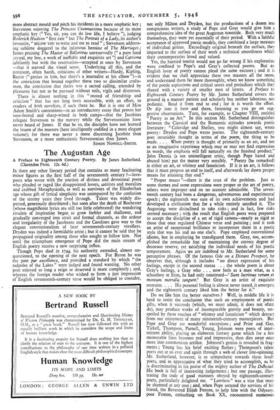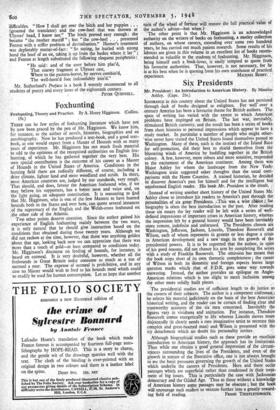The Augustan Age
A Preface to Eighteenth Century Poetry. By James Sutherland. (Clarendon Press. 12s. 6d.)
Is there any other literary period that contains so many fascinating minor figures as the first half of the seventeenth century ?—love- poets who wrote with the unction of divines and devotional poets who pleaded or raged like disappointed lovers, satirists and moralists and crabbed Metaphysicals, as well as survivors of the Elizabethan age whose gift of lyrical simplicity was unimpaired by the confusion of the stormy years they lived through. Talent was widely dis- persed, generously distributed ; but soon after the death of Rochester (whose magnificent lyrics are still too little celebrated) the wandering rivulets of inspiration began to grow feebler and shallower, and gradually converged into strait and formal channels, as the ardour and irregularity of the Jacobeans and the Carolines gave way to the elegant conventionalism of later seventeenth-century versifiers. Dryden was indeed a formidable artist ; but it cannot be said that he propagated originality among those who sought to follow him. Not until the triumphant emergence of Pope did the main stream of English poetry receive a new surprising influx. Though Pope died in 1744, his authority extended, almost un- questioned, to the opening of the next epoch. For Byron he was the poet par excellence, and provided a standard by which " the tadpoles of the Lakes " were judged and found wanting. No other poet enjoyed so long a reign or • deserved it more completely.; and, whereas the foreign reader who wished to form a just impression of English seventeenth-century verse would be obliged to consider, not only Milton and Dryden, but the productions of a dozen less conspicuous writers, a study of Pope and Gray would give him a comprehensive idea of the great Augustan noontide. Both very much themselves, they were yet essentially of their period. With a faithful acceptance of approved poetic models, they combined a large measure of individual genius. Exceedingly original beneath the surface, they imparted to the surface of their work a technical smoothness which their contemporaries loved and valued. Yes, the hurried tourist would not go far wrong if his exploration were confined 'to Pope's and Gray's collected poems. But an English lover of poetry cannot plead 'the same excuses ; and it is evident that. we shall appreciate these two masters all the more, and understand them far more thoroughly, when we know something of the poetic aspirations and critical tastes and prejudices which they shared with a variety of smaller men of letters. A Preface to Eighteenth Century Poetry by Mr. James Sutherland covers the ground in a manner patient and scholarly but neither laborious nor pedantic. Read it from end to end ; for it is worth the effort. Or dip into it here- and there, fastening as you go on sug- gestive observations. Turn, for example, to Chapter VIII, entitled " Poetry as an Art." In this section Mr. Sutherland distinguishes between the Classical and the Romantic attitudes towards poetic literature : " Coleridge and Shelley, you might almost say, wrote poetry: Dryden and Pope wrote poems. The eighteenth-century poet invariably thought in term s of the poem, the thing to be made. . . . When poetry is thought of primarily as an art, and not as an imaginative experience which may or may not find expression in words, the emphasis will fall naturally on the finished product." John Dennis (a not unintelligent critic, though Pope hated and abused him) put the nutter very sensibly. "Poetry (he remarked) is either an art, or whimsy and fanaticism. If it is an art, it follows that it must propose an end to itself, and afterwards lay down proper means for attaining that end."
" Proper means "—there is the crux of the problem. Just as some themes and some expressions were proper to the art of poetry, others were improper•and on no account admissible. The seven- teenth century had been a dangerous, adventurous and experimental epoch • the eighteenth was sure of its own achievements and had developed a civilisation that for a while entirely satisfied it. The Augustaqs were disinclined to take risks • and in fact, few risks seemed necessary ; with the result that English poets were prepared to accept the discipline of a set of rigid canons—nearly as rigid as those that once regulated Chinese verse and painting ; and it took an artist of exceptional brilliance to incorporate them in a poetic style that was his and no one else's. Pope employed conventional idioms, but in employing he transfigured them. Gray, too, accom- plished the remarkable feat of maintaining the correct degree of decorous reserve, yet' satisfying the individual needs of his poetic temperament. Again we are indebted to Mr. Sutherland for some perceptive phrases. Of the famous Ode on a Distant Prospect, he observes that, although it includes "no direct expression of his feelings, except in the second stanza . . . the whole poem is about Gray's feelings, a Gray who . . . now feels as a man what, as a schoolboy at Eton, he had only construed—' Sunt lacrimae rerum et mentum mortalia tangunt.' But Gray is an artist of exquisite restraint. . . . His personal feeling is almost never stated, it emerges; and the eighteenth century liked him the better for it."
Do we like him the,, better ourselves ? Well, in middle life it' is hard to resist the conclusion that such an employment of poetic gifts, when it succeeds (which, we must admit, it does not often do), may produce works of incomparable gravity and beauty, un- spoiled by those touches of "whimsy and fanaticism" which detract from our enjoyment of many nineteenth-century masterpieces. But Pope and Gray are wonderful exceptions ; and Prior and, Gay, Tickell, Thompson, Parnell, Young, Johnson were poets of inter- mittent ability, playing an elaborate literary game which for a few memorable lines becomes real and impressive, then dies away once more into ceremonious artifice. Johnson's genius is revealed in frag- ments ; Young has his brief exciting flashes ; Thompson's talent peers out at us ever and again through a web of clever line-spinning. Mr. Sutherland, however, is as sympathetic towards these lesser poets, and as appreciative of what they tried to accomplish, as he is discriminating in his praise of the mighty author of The Dufwiad. His book is full of interesting judgements ; but one passage, illus- trating the code of good manners obeyed by eighteenth-century poets, particularly delighted me. " Lowness." was a vice that must be shunned at any cost ; and, when Pope secured the services of his friend, the Reverend Elijah Fenton, to help him with the Odyssey, poor Fenton, embarking on Book XX, encountered numerous
difficulties. " How I shall get over the bitch and her puppies . . . (groaned the translator) and the cow-heel that was thrown at Ulysses' head, I know not." The bitch proved easy enough: she became " the mother mastiff " ; but " the cow-heel . . . presented Fenton with a stiffer problem of devitalisation." Homer's treatment was deplorably matter-of-fact: " So saying, he hurled with strong hand the hoof of an ox, taking it up from the basket where it lay" ; and Fenton at length substituted the following eloquent periphrasis " He said: and of the steer before him plac'd, That sinewy fragment at Ulysses cast, Where to the pastern-borne, by nerves combin'd, The well-horn'd foot indissolubly join'd."
Mr. Sutherland's Preface is a book I warmly recommend to all students of poetry and every-lover of the eighteenth century.
PETER QUENNELL. PETER QUENNELL.











































 Previous page
Previous page